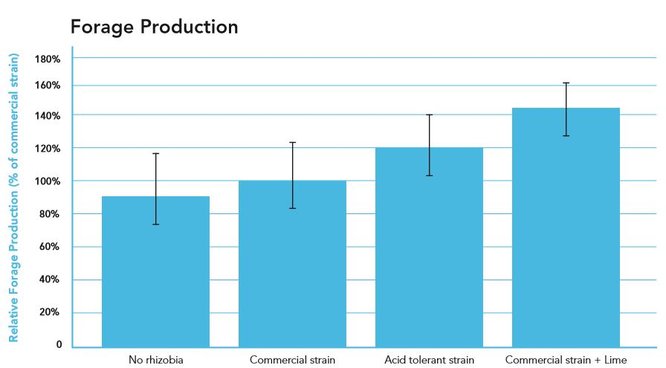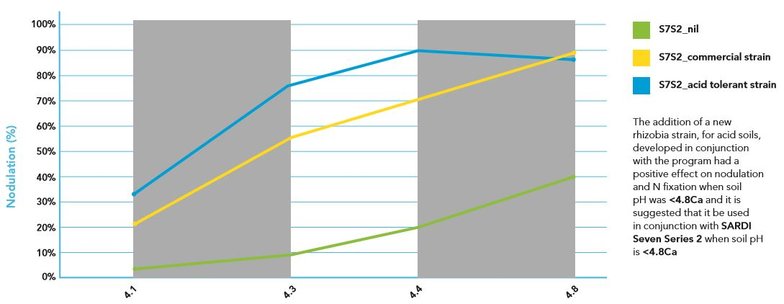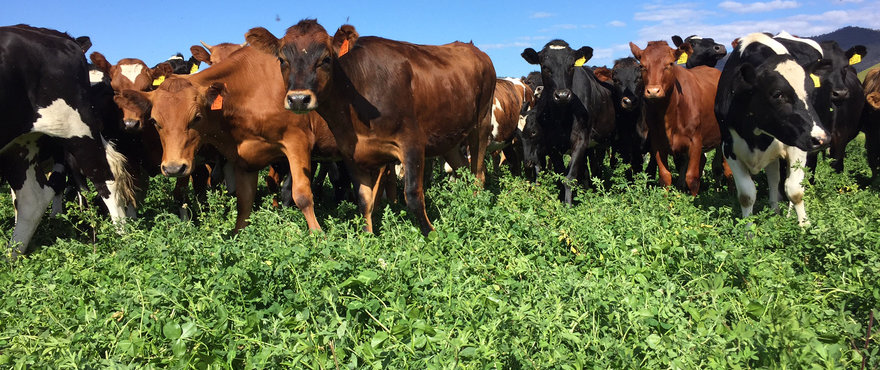Download a copy of the SARDI 7 Series 2 Lucerne factsheet.
SARDI 7 Series 2 is the next generation in winter active lucerne. Versatility, broad adaptation and persistence make it a market leading variety. It has been bred specifically for adaption to the Australian climate and will perform well in both dryland and irrigated systems. SARDI 7 Series 2 is ranked higher for persistence than most other commercial cultivars in Australian trials.
SARDI 7 Series 2 will provide superior performance wherever SARDI 7 has been successful. This includes where persistent, high producing lucerne stands are required and in grazing situations where winter produced feed can be utilised. It is suited to direct grazing or hay and silage production and can be sown in pasture mixes or under-sown in cropping systems. In addition, SARDI 7 Series 2 will perform well in dairy, beef and sheep production systems in high rainfall zones where dormant or semi-dormant varieties have traditionally been grown. It will persist and produce more dry matter than winter or semi-winter dormant varieties delivering more feed during the winter months when feed is in demand. Through work conducted by Meat and Livestock (MLA), SARDI 7 Series 2 has shown improved tolerance to acid soils (pH >4.5Ca). Superior AgriCote technology now includes 2 strains of rhyzobia which further enhances its performance in acidic soils.
Segment
- Dual purpose, grazing and/or hay systems
- Specialist hay production in cool winter environments
Key features
- Winter Activity 7
- Excellent disease/pest package
- Broad adaptability into all Australian lucerne growing regions
- Superior establishment, growth and persistence in acidic soils down to pH 4.5Ca
- Improved tolerance to cool, wet environments
- Broad crowns and fine stems leading to high quality forage production
Key benefits
- Performs well in dairy, beef and sheep production systems in high rainfall zones
- Delivers more feed during the winter months
- Grazing tolerant due to ‘in field’ selection
Breeding History
SARDI 7 Series 2 was developed using multiple cycles of selection for persistence and yield on Australian commercial farms under a range of farming systems (cattle, sheep, hay, dryland and irrigation). This process was combined with intensive screening for reduced stem thickness and leafiness plus tolerance to bluegreen aphid, spotted lucerne aphid, anthracnose and phytophthora root rot. This makes SARDI 7 Series 2 produce high quality forage with greater persistence.
Plot density
SARDI 7 Series 2 demonstrates superior ‘in field’ persistence against competitors in acid soils (pH < 4.8Ca).
Forage yield
SARDI 7 Series 2 demonstrates similar forage production, to leading cultivars within the Wa 5−7 group under a ‘cut’ system not exposed to grazing or high pest/disease pressure.
SARDI 7 Series 2 demonstrates superior forage production, in independent trials conducted at Casterton, VIC as part of the MLA Pasture Variety Trial Network (PVTN).
Pest and Disease Resistance
SARDI 7 Series 2 has very high levels of resistance to the pest and disease strains present in Australia. SARDI varieties are screened using new strains of virulent pathogens collected from field sites – this breeds resistance to the ever changing challenges that lucerne varieties will face. To deliver increased tolerance to cold, wet environments, the majority of the parentage comes from field selections in Victoria and New South Wales.
Improved performance in acidic soils

The acid tolerant strain in low pH soils can lead to improvements in forage production. Nevertheless, commercial applications of lime to adjust for pH has the best overall benefit to forage production. (Source Ross Ballard SARDI)
In Field Nodulation

The addition of the acid tolerant rhizobia strain (in addition to normal rates of traditional strain) increases the base CFU count on the seed, resulting in symbiosis to form between rhizobia and plant, with the most suitable & adaptable strains for the soil pH. As can be seen above the acid tolerant strain improves nodulation when pH is less than 4.8ca. In paddocks that have been limed, there is likely to be significant variation across paddocks that having multiple strains will help combat.
In the event that SRD 1736 Acid Tolerant rhyzobia is not available, Agricote will always contain appropriate levels of the standard AL strain.
Plant Breeders Rights (PBR): This variety is registered under Plant Breeders Rights (PBR) in Australia. Unauthorised commercial propagation or any sale, conditioning, export, import or stocking of propagating material is an infringement under the Plant Breeders Rights Act (1994). Any breach of this legislation will leave the grower liable for prosecution.
Disclaimer: The information presented in this brochure is from official and other sources and is considered to be reliable. It is provided in good faith and every care has been taken to ensure its accuracy. Barenbrug does not accept any responsibility for the consequences that may arise from the acceptance of recommendations or the suggestions made.


